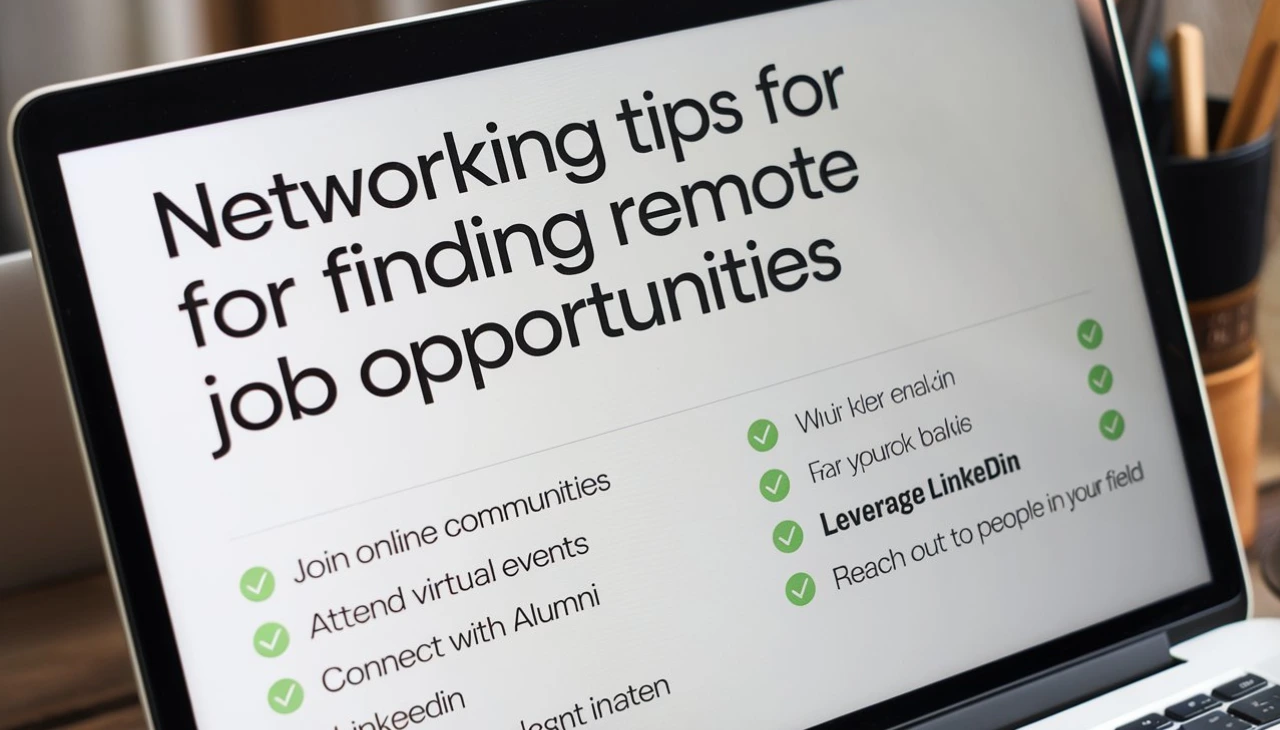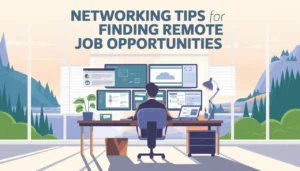The world of work is undergoing a seismic shift, with Networking Tips for Finding Remote Job. The flexibility, cost-effectiveness, and improved work-life balance it offers have made it a desirable option for both employees and employers. However, even in this digital age, the power of personal connections remains undeniable. Networking continues to play a vital role in securing remote job opportunities.
This post will explore effective networking strategies for finding remote work. We will delve into the importance of personal referrals, the benefits of attending virtual events, the power of online communities, and the strategic use of social media. By understanding and implementing these tactics, you can significantly enhance your chances of landing your dream remote job.

The Power of Personal Connections
In this modern world wherein online job boards and applicant tracking systems are standing up to become the standard, it would seem almost counterintuitive to give credit to the old ways, or at least to personal connections during a job search. However, it can make all the difference when you receive an invitation to a remote job based on the person who referred it to you.
The Benefit of Referrals
Referrals work well for a variety of reasons:
Trusted Recommendation: Whenever an associate asks you to apply for an opening, to the human resources manager, that must mean you are a good and reliable candidate.
Access to Unpublished Jobs: Referrals often bring a hidden job post that is not advertised on the public domain.
Credibility: A referral will add credibility to your application, especially if your referral is well known in the industry.
More Chances for an Interview: Different research results indicate that an applicant who was referred or presented by any employee has a greater chance of getting interviewed and eventually hired.
Leveraging Your Network
How do you leverage your network?
Recommendations and Referrals
Reach out to previous connections: Start with your contacts, be those former colleagues, classmates, friends, or even relatives. You can tell them what you are doing: working online and find out if maybe they have any ideas or leads.
Network further: You can also network by attending industry events and professional association. That would mean you will make new contacts on the online forums.
Leverage Social Media: LinkedIn, Facebook and Twitter are tremendous networking tools. Connect with people in your industry, join relevant groups, and share your career goals.
Offer Value: Don’t just ask for favors. Be proactive in offering help to others in your network. By building relationships on a mutual respect and support basis, you increase your chances of receiving referrals in the future.
Networking Sites on the Internet
Online networking sites can not only connect you to people but also be very useful in finding remote work opportunities. Here are some of the best networks:
LinkedIn: The largest professional network globally, LinkedIn is an excellent opportunity to reach out to current or potential employers and other professionals in the industry in general. Find groups related to your profession and join them. Follow companies of interest and engage actively in the discussions.
Facebook Groups: There are millions of Facebook groups on subjects related to remote work, industries, and even locations. So join groups that align with what you’re looking for in your career and engage in discussions to build those kinds of relationships and discover other opportunities.
Specialized industry forums at Reddit, Quora, or any specialized industry forum where you may engage experts directly may be very valuable. Use them as your means of asking questions, sharing your knowledge, and participating in discussions to build up your reputation and your network with potential employers.
With this possibility, you can acquire the best remote jobs ever with your personal connections and by actively engaging in internet networking. In short, relationships are living processes. So even if you get another job, do not stop connecting and maintaining relationships.
Attending Virtual Events and Conferences
Virtual events and conferences have emerged nowadays as a massive platform to network and develop a professional platform. As compared with all traditional events, these online events provide ease and accessibility that was lacking in common in-person events: you can join from any internet-enabled location with no travel or stay.

Finding Relevant Events
To network effectively, it is important to locate virtual events relevant to your career goals and interests. Here are some tips that may be helpful in locating the right ones:
Online calendars of events: Explore niche communities and websites that publish lists of future virtual conferences, webinars and meetups.
Associations in your industry: Check the websites of associations and professional organizations that will be hosting virtual events.
Social media: Connect to industry influencers and companies on LinkedIn, Twitter, and Facebook. They often provide information about virtual events.
Networking groups: Search for online networking groups and forums where the people attending talk about their future events and give out recommendations.
Building Meaningful Connections with Attendees
Once you identify the virtual events you might attend, it’s time to get in touch with attendees. Here are ways you might begin building meaningful connections:
Get ready for the event. Research on who will be presenting, what they will talk about, and who is the other guest; this will help you to find connection points as well as prepare meaningful questions.
Take part in the event: Participate in the discussions and ask questions. It will make you noticeable and, therefore, remembered.
Utilize the chat box: Use the box to take part in the general discussions. It is a simple way to get going on conversation and sharing information.
Virtual meeting scheduling: Schedule a follow-up meeting or calls with the people you get connected with after the event.
Email follow-up : draft an email to the new contacts made thanking them for their time and something specific that was mentioned.
All of these tips will help you make proper use of virtual events in order to improve your professional network, learn from industry experts and even discover new opportunities. All’s not forgotten that the secret ingredient to great networking lies in building actual relationships and real, lifelong connections.
Joining Online Communities and Forums
In this work-from-home world, online communities and forums are some of the best ways to get in touch with a potential employer or industry professional. This is because online communities serve as virtual ground where individuals with similar interests share information, exchange knowledge, and eventually build relationships.
Finding Niche Communities
First of all, one should browse the internet very carefully using appropriate keywords that have close relevance with our career goals and interests. One should seek online forums, groups, and subreddits on remote work or specific industries/regions. Some of the other popular domains that come to mind are:
LinkedIn: There is a huge professional network and an extensive number of industry-specific groups on LinkedIn.
Reddit: It is an online treasure trove of communities. Be the topic of any interest, subreddits are there for almost everything.
Facebook Groups: These help provide a casual and interactive networking space.
Slack: This is mostly used for team collaborations but many public Slack channels and workspaces exist on topics about different industries and remote work.
Industry-Specific Forums Seek forums specializing in your field or industry. For instance, if you are a developer, look into forums like Stack Overflow or GitHub Communities.
Active Participation
Once you are in the community, you should be active to start contributing. You should be able to comment or question and share your knowledge and experiences. You can do this by showing your expertise and relating to other people. In any event, you are not there to promote yourself only but a great contributor to the community.
Here’s how you can get active:
Be helpful: Be of service to the other members as much as possible.
Discuss your ideas: Share your thoughts about current issues.
Ask for recommendations: Don’t be afraid to ask others for suggestions.
Be a friend: Politely communicate with anyone you encounter.
Establishing Trust with Others
Building trust and becoming friends with others in the community will be key to long-term success. Reflect on the following:
Genuine discussions: Get beyond the small talk and discuss topics that you would consider of real interest.
Offer value: Provide value to the people within it.
Be authentic: Be yourself.
Connect personally: Share personal stories and anecdotes to connect with them at a deeper level.
Follow up: Stay in contact with those that you have made personal connections with.
You will be much more likely to find remote jobs when you’re an active participant in online communities and getting to know other members.
Utilizing Social Media for Networking
Social media revolutionized the way individuals connect with others, even businesses. This became a very great tool in networking and in finding remote work opportunities. You can even create your professional brand by having platforms like Twitter, Instagram, and TikTok to establish connections with potential employers and industry experts.

Tapping Social Media Platforms
Known for its real-time updates and short form, Twitter is an excellent way of holding discussions, adding feeds of articles, and following all the industry news. One can get highly visible by putting up relevant hashtags and getting in touch with like-minded people.
Instagram: Mainly a photo-focusing app, Instagram provides great scope to showcase your work and capabilities. Share high-quality images and videos about the work you’ve done and expertise in with people and their behind-the-scenes glimpses of how you spend time at work through Instagram Stories.
TikTok: When you hear the word TikTok, you probably think of short-form entertainment content. While that does make up a good chunk of the content on the platform, networking also takes place there. So, create engaging videos to flaunt your talents or gain insight into your industry. Always use relevant hashtags and join the trending challenges to expand the reach. Build an Online Professional Presence
Profile completeness: Your social media accounts must be complete and accurate. Ensure that all updated, clear, concise professional headshots are linked with bio descriptions and that you add links to your portfolio or personal website.
Have relevant content: Content that is professionally related to your goals and presents yourself as an expert in your field may go into the mix. Articles, blog posts, news in the industry, and even personal projects fit into the mix.
Use relevant hashtags. Track and use the correct hashtags to get a wider coverage of your posts and relate to other users who are interested in your field.
Engage with others: Comment on other people’s posts, share other people’s content, and comment on anything relevant to keep the discussions going. Doing this will help you build relationships and you will become a member of the community. Engaging with Industry Influencers
Identify key influencers: Identify the influential people in your industry. Openly follow what they are posting on social media.
You can make friends with other professionals in your industry: You should search the internet to find communities and groups that are formed around your specific industry. Just go ahead and start participating in those discussions. Share your opinion on different topics. That way, you would help in advancing the knowledge in that particular field.
Using social media in a smart way will expand your professional networks and also work to build a sense of brand and, in turn, the potential for remote work. Just keep it consistent, authentic, and engaging.
Conclusion
In today’s high-tech rapidly changing workforce, the human touch remains paramount. Networking, therefore, remains very much the starting point to acquiring the position you desire. Never forget to add your personal referrals and engage actively in virtual events and online communities while strategically using social media channels.
Remember that information exchange is one of the purposes of networking; however it’s additionally building relationships by cultivating really genuine connections, offering value to others by helping them with something they would be in need of, and finding opportunities for learning and growth. Investment time and effort into networking will benefit you in not just a professional network that expands but also positions you as an asset to your potential employer.
Therefore, do not wait any longer for those people you already connect with, participate in virtual events and join relevant online forums to connect with industry influencers on social media. The more you network, the more opportunities come your way, and don’t forget that networking is not just a strategy in the work-from-home sphere but a necessity as well.
Additional Tips
To add more flavor to your post and make it even more interesting and informative, here are a few suggestions:
Use Images
Infographics: Take images in the form of infographics representing key points or statistics in relation to networking and remote work.
Screenshots: Post screenshots from some common networking applications or examples of social media posts.
Images: Use relevant pictures as a means of inserting beauty into your post as well as breaking long chunks of text.
Case studies: Actual examples of successful remote job searchers using networking as a way to find remote employment.
Testimonials: Quotes from clients who have benefited from the networking strategies.
Success stories: Inspirational stories of people facing issues but finding their way through networking successfully to eventually attain their aims of remote working.
Call to Action
Engage the reader to share their experiences, tips or even their success stories in the comment section.
Ask questions: Ask deep thought-provoking questions to get people talking and interacting.
Additional Resources Provide additional readings in the form of related articles, or websites, or online courses to further explore.
Here’s how you can end your post with a call to action:
Have you ever successfully leveraged networking to get remote work? Share your experiences and some tips in the comments below.
With these more tips, you will create a more attractive, informative, and engaging post meaningful to your audience and that they can use successfully in achieving their goals for remote work.
FAQs: Networking Tips to Get That Remote Job Opportunity
What are the Basic Networking FAQs?
How relevant is the element of networking for remote job opportunities in the current digital age?
While the digital world may have supplanted a lot of the mundane routine of accessing opportunities, networking is still quite relevant when it comes to seeking opportunities because personal contacts can be sources of vital information that really makes sense, referrals, and access, which is hard to get on the internet.
What benefits does networking provide to remote job seekers?
Networking increases your visibility, expands your professional network, provides you with access to behind-the-scenes job opportunities, and gives you a glimpse into the remote world.
Building Your Network
How can I leverage my current network to access remote job opportunities?
Some effective ways to meet new people and build relationships online:
Joining online communities and forums related to your industry or interests. Participating in discussions, answering questions, and sharing your expertise. Attending virtual events and conferences to connect with like-minded professionals.
Attending Virtual Events
How do I find relevant virtual events and conferences?
Leverage free online event calendars, industry-specific websites, and social media to identify virtual events that will support your career goals.
How do you network successfully at virtual events?
Prepare questions and follow up in general conversations; follow up with attendees after the event to keep a relationship live
Using Social Media
What are the most effective social media sites for networking?
LinkedIn is the way to specialize in the building of professional relations. Even though through those other environments like Twitter, Instagram, and Facebook you can also make powerful relations and propagate your expertise.
How do I build a strong online presence that could attract potential employers?
Fill out all the sections of your profile; highlight your skills and experience and share content that adds value to your industry.
Some Extra Tips
How would you suggest I follow up on a networking meeting?
E-mail Thank-you note within 24 hours in your own words: Summarize your discussion and let them know that you’re interested in keeping in touch.
How do I overcome my fear of networking?
Active listening would be helpful as well as asking open-ended questions to really hear what each other is saying. Think of it this way-no one likes to network, we all are a little anxious, but it can be done.







